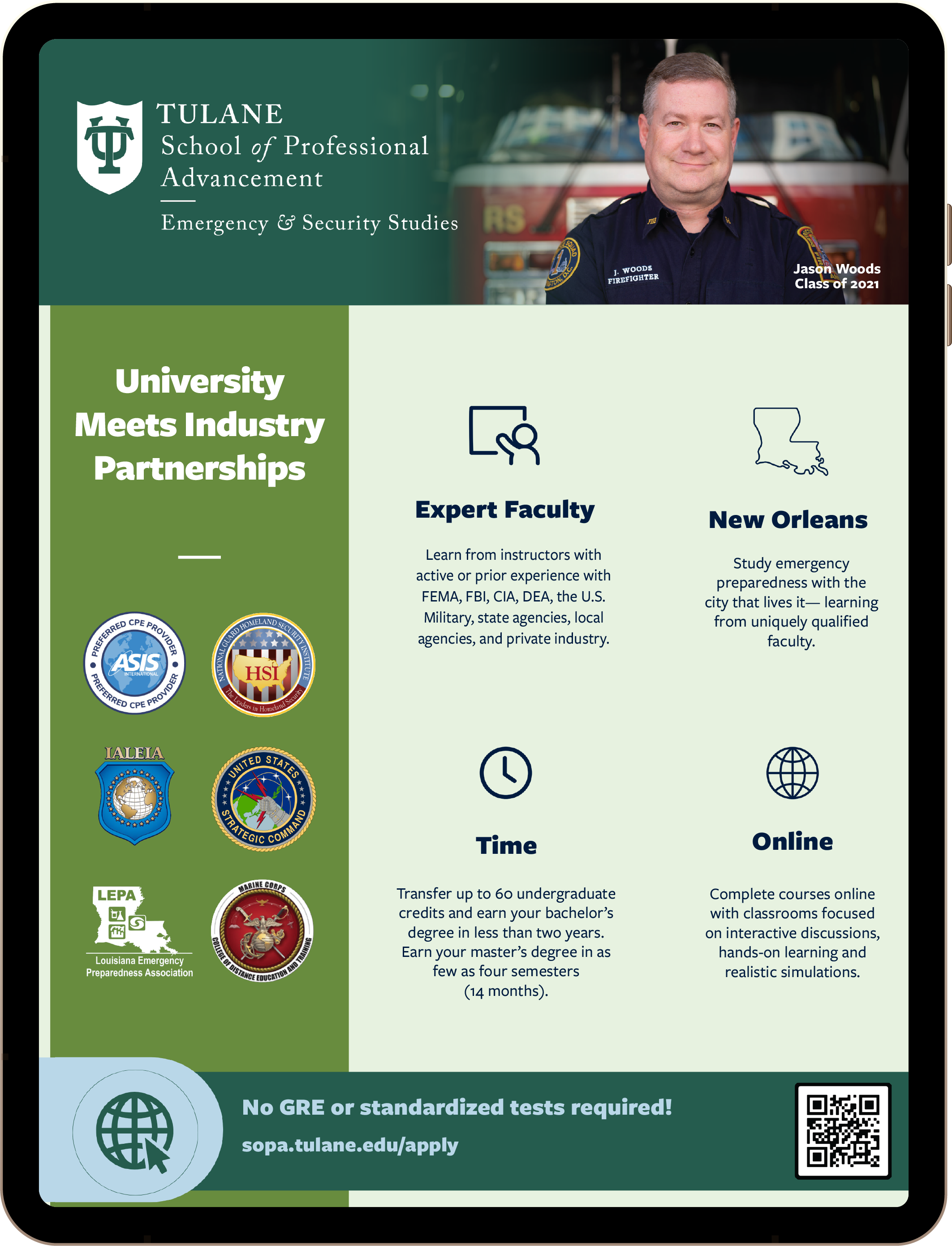Master of Professional Studies in Homeland Security Studies
Request Information
By submitting this form, you agree to receive information about the Tulane School of Professional Advancement’s programs via email, phone and/or text. You may opt out at any time.
Master of Professional Studies in Homeland Security Studies Degree at a Glance
Spark your passion for helping others while also amplifying your career possibilities with an advanced degree from the Tulane School of Professional Advancement. The Master of Professional Studies (MPS) in Homeland Security Studies focuses on securing and maintaining the safety of U.S. residents through practical applications of security and emergency management.
From courses on domestic and international terrorism and intelligence research methods to examinations of emergency management and border security, the curriculum dives deep into the policies and strategies used in today’s advanced homeland security sector. Upon completion of core courses, you will also have the opportunity to develop an individual plan of study with the Program Director based on your specific interests, including courses outside the Emergency and Security Studies program available on-campus.
TRANSFER
Transfer up to nine credits of graduate level courses to your program and earn your degree for less.
FACULTY
Nationally recognized faculty who practice what they teach and help you succeed beyond the classroom.
LOCATION
Flexible online courses that match your schedule. Accelerate your career without putting your life on pause.
BENEFITS
Course credit for experience and 20% tuition discounts available.
ADMISSIONS
Rolling admissions. No test scores. No recommendations. Three start dates. We make the admission process easy.
What You Will Learn While Earning Your Degree in Homeland Security Studies
- Terrorism and Counterterrorism: Understanding terrorist motivations and counterterrorism strategies.
- Emergency Management and Disaster Response: Preparing for, responding to, and recovering from disasters.
- Intelligence and Information Sharing: Collecting, analyzing, and disseminating intelligence for threat prevention.
- Critical Infrastructure Protection: Securing essential services like transportation and energy against threats.
- Legal and Ethical Issues: Studying laws and ethical considerations related to surveillance, privacy, and civil liberties.
These concepts equip you with the skills needed to protect the nation from diverse threats and ensure public safety.
- Intel Analysis and Critical Thinking
- Critical Infrastructure Protection
- Approaches to Counter Terrorism
Click here for listing of MPS in Homeland Security Studies required courses and course descriptions.
The MPS consists of four core graduate courses that cover a range of academic disciplines such as medical issues for non-medical emergency managers, intelligence analysis, maritime security, and advanced approaches to counterterrorism.
The School of Professional Advancement awards the MPS in Homeland Security Studies degree following the successful completion of 11 graduate courses comprised of six core 600-level courses and one core 700-level course, which may include graduate courses from other Tulane schools. No thesis is required. Graduate students seeking to enroll in more than 9 credit hours per semester require approval from the Program Director. Students may not apply more than two independent study courses toward fulfilling graduation requirements for the MPS.

An Entirely Online Degree
We believe that going back to school shouldn’t have to mean putting your life on hold. That’s why Tulane SoPA students may choose to complete their master’s entirely online*. See how homeland security and emergency management impact people’s day-to-day lives by visiting our program’s YouTube playlist.
*Select elective courses not within the Emergency and Security Studies program may only be offered on campus and not in online formats.
Faculty Who Practice What They Teach
By day, our professors are leaders in the fields of intelligence, security, and emergency response. They bring their daily experience to the classroom to ensure you are learning real-world professional skills to further your career. Industry leaders serving on program advisory boards ensure faculty teach relevant curriculum connected to the real-world.

SoPA Faculty Feature
“Our practicioner faculty is focused on one thing—preparing the next generation of homeland security and emergency management professionals.”
Michael Wallace, Ed.D.
Emergency & Security Studies Program Director
Retired military intelligence officer with 20 years of active service
Develop Job-ready Technical Skills From Industry Leaders
The MPS in Homeland Security Studies will prepare students to work in the fields of emergency management, intelligence analysis, counterterrorism analysis, cyber security, border protection and security, and infrastructure protection at all levels of government and in the private sector. Those with experience in the military or as a first responder can apply their knowledge and enhance their technical and interpersonal skills through this program. As a Silver Award Military Friendly® recipient, our office of Veterans Affairs is committed to your success and can connect you to educational benefits, learning resources, and financial aid.
Graduates can pursue the following professional roles:
- Intelligence Community Officer
- Counterterrorism Analyst
- Federal, State, or Local Law Enforcement Officer
- Federal, State, or Local Homeland Security Officer
- Border and Immigration Officer
- Infrastructure Protection Analyst
- Transportation Security Analyst
- Maritime Security Analyst

SoPA Student Spotlight
“SoPA gave me much more than a textbook education. It gave me the ability to approach my professional life with a broader outlook and a more capable network.”
Chris Cox
Tulane SoPA class of 2018
Engaging & Flexible Student Experience, On-Campus & Online
Partnerships that translate into industry certifications, credit for experience, & career advancement opportunities.
Never watch a boring PowerPoint. We’ve developed the most interactive courses around.
Our courses are constantly refreshed and informed by what leaders in emergency & security fields expect from graduates.
Navigate degree requirements and prepare for the workforce with help from our academic advisors and career counselor.
Tuition and Aid
Tulane SoPA is more affordable than traditional private university tuition. With limited fees and a 20% tuition discount (if qualified), cost is on par with many state schools.
All tuition is charged by the credit hour and we have minimal fees. Visit our tuition page to see our current tuition rates and use our net price calculator.
We strive to make higher education affordable by offering 20% discounts, financial aid, and credit for work and life experience. Learn about financial aid, discounts and scholarship opportunities to fund your master's in Homeland Security Studies today.
Admissions
Apply anytime—no test scores or letters of recommendation are required.
Students applying to the MPS in Homeland Security Studies program must hold a baccalaureate degree from a regionally accredited college or university. Applications to the program must include the following:
- A statement of 250-500 words discussing their background beyond academic coursework, and how the program will assist them to achieve professional objectives.
- Official college transcripts from each college attended. Typically, successful applicants will have at least a “B” (3.00) average in all coursework taken.
Applicants may be conditionally admitted and allowed to take one class in their first semester, in which a B or better must be earned to be fully admitted to the program. Students who do not meet the 3.00-grade point average in their undergraduate coursework but who possess sufficient professional experience in the security studies field may be admitted provisionally into the program.
Completed applications are reviewed by the MPS in Homeland Security Studies Director, Dr. Michael Wallace and Admissions Committee throughout the year.
To begin the admissions process, complete the online application.
Students in good standing may petition to transfer a maximum of nine credit hours (three courses) of graduate coursework from other colleges or universities to the MPS degree. However, only courses with grades of B or better, completed within five years of enrolling in the MPS program, may be considered for transfer credit.
A Unique “Stackable” Certificate Program
Students in good standing may petition to transfer a maximum of nine credit hours (three courses) of graduate coursework from other colleges or universities to the MPS degree. However, only courses with grades of B or better, completed within five years of enrolling in the MPS program, may be considered for transfer credit.
Earn Your Degree in Homeland Security Studies at Tulane SoPA
Interested in putting your skills to work for your future? Start your application today to earn your degree in Homeland Security Studies from a world-renowned university.

Enter your email to download our Emergency and Security Studies e-brochure.
By submitting this form, you agree to receive information about the Tulane School of Professional Advancement’s programs via email, phone and/or text. You may opt out at any time.














